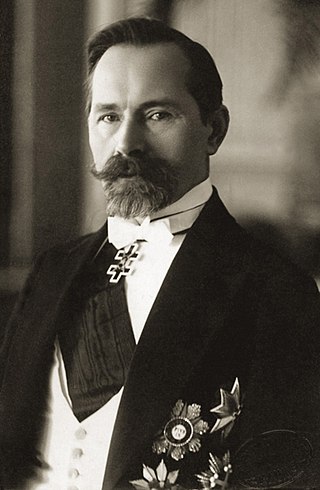
Antanas Smetona was a Lithuanian intellectual, journalist and politician who served as the first president of Lithuania from 1919 to 1920 and again from 1926 until the Soviet occupation of Lithuania in 1940. Referred to as the "Leader of the Nation" during his presidency, Smetona is recognised as one of the most important Lithuanian political figures between World War I and World War II, and a prominent ideologists of Lithuanian nationalism and the movement for national revival.

The prime minister of Lithuania is the head of the government of Lithuania. The prime minister is Lithuania's head of government and is appointed by the president with the assent of the Lithuanian parliament, the Seimas. The modern office of prime minister was established in 1990, when Lithuania declared its independence, although the official title was "Chairperson of the Council of Ministers" until 25 November 1992.

"Tautiška giesmė" is the national anthem of Lithuania, also known by its opening words, "Lietuva, Tėvyne mūsų", and as "Lietuvos himnas". The music and lyrics were written in 1898 by Vincas Kudirka, when Lithuania was still part of the Russian Empire. The fifty-word poem was a condensation of Kudirka's conceptions of the Lithuanian state, the Lithuanian people, and their past. Shortly before his death in 1899, the anthem was performed for Lithuanians living in Saint Petersburg, Russia.

Antanas Merkys was the last Prime Minister of independent Lithuania, serving from November 1939 to June 1940. When the Soviet Union presented an ultimatum to Lithuania demanding that it accept a Soviet garrison, President Antanas Smetona fled the country leaving Merkys as acting president. Merkys ostensibly cooperated with the Soviets, and illegally took over the presidency in his own right. After three days, Merkys handed power to Justas Paleckis, who formed the People's Government of Lithuania. When Merkys attempted to flee the country, he was captured and deported to the interior of Russia, where he died in 1955.
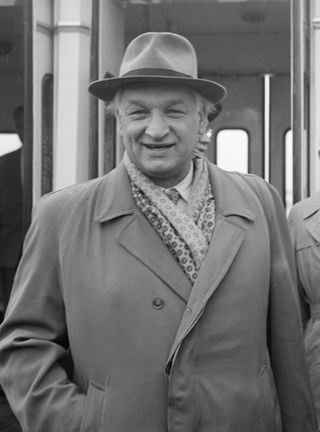
Justas Paleckis was a Lithuanian Soviet author, journalist and politician. He was nominal acting president of Lithuania after the Soviet invasion while Lithuania was still ostensibly independent, in office from 17 June to 3 August 1940. He then remained the head of state of the Lithuanian SSR until 1967.

Antonis Samaras is a Greek politician who served as 14th Prime Minister of Greece from 2012 to 2015. A member of the New Democracy party, he was its president from 2009 until 2015. Samaras started his national political career as Minister of Finance in 1989; he served as Minister of Foreign Affairs from 1989 to 1992 and Minister of Culture in 2009.
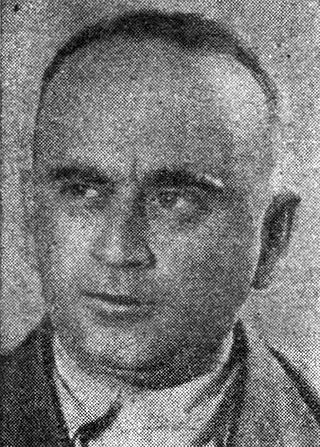
Vladimir Georgievich Dekanozov was a Soviet senior state security operative and diplomat.
The People's Seimas was a puppet legislature organized in order to give legal sanction the occupation and annexation of Lithuania by the Soviet Union. After the Soviet ultimatum in June 1940, a new pro-Soviet government was formed, known as the People's Government. The new government dismissed the Fourth Seimas and announced elections to the People's Seimas. The elections were heavily rigged, and resulted in a chamber composed entirely of Communists and Communist sympathizers. The new parliament unanimously adopted a resolution proclaiming the Lithuanian Soviet Socialist Republic and petitioned for admission to the Soviet Union as a constituent republic. The Supreme Soviet of the USSR accepted the Lithuanian petition on August 3, 1940. The People's Seimas adopted a new constitution, a close copy of the 1936 Soviet Constitution, on August 25 and renamed itself to the Supreme Soviet of the Lithuanian SSR.

The Act of the Re-Establishment of the State of Lithuania or Act of 11 March was an independence declaration by Lithuania adopted on 11 March 1990, signed by all members of the Supreme Council of the Republic of Lithuania led by Sąjūdis. The act emphasized restoration and legal continuity of the interwar-period Lithuania, which was occupied by the Soviet Union and annexed in June 1940. In March 1990, it was the first of the 15 Soviet republics to declare independence, with the rest following to continue for 21 months, concluding with Kazakhstan's independence in 1991. These events led to the dissolution of the Soviet Union in December 1991.
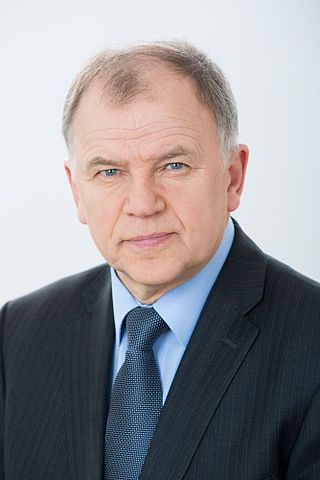
Vytenis Povilas Andriukaitis is WHO Special Envoy for the European region, the former European Commissioner for Health and Food Safety, a heart surgeon, a co-signatory to the 1990 Act of the Re-Establishment of the State of Lithuania.
Paleckis is the masculine form of a Lithuanian family name. Its feminine forms are: Paleckienė and Paleckytė.

Rimantas Jonas Dagys is a Lithuanian chemist and politician, member of the Seimas, and from 2008 to 2009 assigned Minister of Labor and Social Security by presidential decree.
The People's Government of Lithuania was a puppet cabinet installed by the Soviet Union in Lithuania immediately after Lithuania's acceptance of the Soviet ultimatum of June 14, 1940. The formation of the cabinet was supervised by Vladimir Dekanozov, deputy of Vyacheslav Molotov and a close associate of Lavrentiy Beria, who selected Justas Paleckis as the prime minister and acting president. The government was formed on June 17 and, together with the People's Seimas (parliament), transitioned independent Lithuania to a socialist republic and the 14th republic of the Soviet Union thus legitimizing the Soviet occupation of Lithuania. The People's Government was replaced by the Council of People's Commissars of the Lithuanian SSR on August 25. Similar transitional People's Governments were formed in Latvia and Estonia.
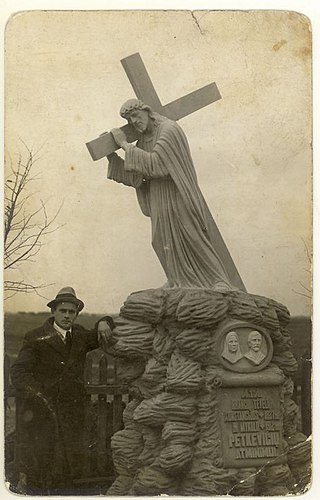
Benjaminas Jakševičius was a Lithuanian sculptor and partisan. Together with his brother Vincentas and nephews Silvanas and Adomas, he contributed to religious art by building sacred statues and altars, mainly in Panevėžys, Švėkšna and various other parts of Lithuania. He also built several sculptures, predominantly religious ones, in Troškūnai, Kavarskas, Burbiškis, Upytė, Raguva and Pasvalys.

The Socialist People's Front is a left-wing political association in Lithuania formed in December 19, 2009, from a merger of the Front Party and Lithuanian Socialist Party. Held at Vilnius University, the party's foundation featured 102 delegates. The merger was approved by an affirmative vote of 96 delegates, with three against and one abstaining. The leader of the Lithuanian Socialist Party, Giedrius Petružis, refused candidacy for chairperson of the merged party, claiming a desire to return to academic life. The leader of the Front Party, Algirdas Paleckis, was unanimously chosen as the leader of the SPF.

Parliamentary elections were held in Lithuania on 14–15 July 1940 to the so-called People's Seimas. They followed an ultimatum from the Soviet Union to allow Soviet troops to enter the country and operate freely. The elections were rigged and only communist candidates were allowed to run.

Algirdas Paleckis is a Lithuanian diplomat, politician, columnist, leader of the political movement The Dawn of Justice. Šiauliai district court convicted Paleckis for spying for Russia in July 2021. The conviction was upheld by the Lithuanian Court of Appeal in May 2022.

Jonas Aukštuolis was a Lithuanian diplomat. During World War I, he worked for the Lithuanian Society for the Relief of War Sufferers and was sent to Stockholm to organize contacts with German-occupied Lithuania. He was the Lithuanian representative in Sweden and Norway (1919–1922), Netherlands (1921–1922), Latvia (1923–1927), Estonia (1923–1930), Finland (1929–1934), Czechoslovakia (1932–1934), Argentina, Uruguay, and Brazil (1934–1939). In 1939, he was recalled to Kaunas and was deported by the Soviets to a Gulag camp in June 1941. He died in one of the camps in Mordovia.
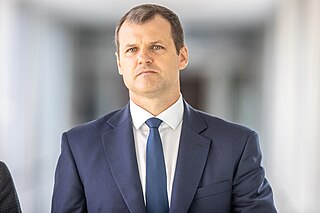
Gintautas Paluckas is a Lithuanian politician.

The Union of the Working People of Lithuania or Union of Lithuanian Working People was the front organization set up by the Communist Party of Lithuania after the Soviet occupation of Lithuania to take part in the rigged 1940 Lithuanian parliamentary election to the so-called "People's Seimas". The organization ceased to exist as soon as the elections passed.

















